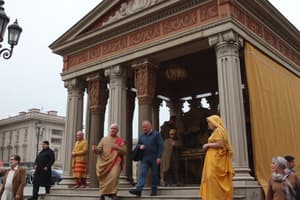Podcast
Questions and Answers
What is the total mark allocation for Part A of the exam format?
What is the total mark allocation for Part A of the exam format?
- 40 marks
- 20 marks
- 10 marks (correct)
- 30 marks
Which sociological perspective is likely to focus on social class differences in education outcomes?
Which sociological perspective is likely to focus on social class differences in education outcomes?
- Conflict Theory (correct)
- Functionalism
- Symbolic Interactionism
- Social Constructivism
In which week of the course are topics related to social inequality covered?
In which week of the course are topics related to social inequality covered?
- Week 10/11 (correct)
- Week 8
- Week 6
- Week 11/12
What does a 'partial compensation' approach suggest regarding education outcomes?
What does a 'partial compensation' approach suggest regarding education outcomes?
How many questions must be answered in Part B of the exam?
How many questions must be answered in Part B of the exam?
Which of the following topics is NOT mentioned as a focus for medium answer questions?
Which of the following topics is NOT mentioned as a focus for medium answer questions?
The concept of 'credential inflation' is related to which of the following?
The concept of 'credential inflation' is related to which of the following?
What is emphasized as important to understand about the mechanisms that generate social outcomes?
What is emphasized as important to understand about the mechanisms that generate social outcomes?
What is the time duration of the Soc 101 Final exam?
What is the time duration of the Soc 101 Final exam?
Which aspect of sociology focuses on issues like social class differences in education?
Which aspect of sociology focuses on issues like social class differences in education?
What is an essential requirement when submitting answers in Part A?
What is an essential requirement when submitting answers in Part A?
Which of the following weeks focuses on Groups and Networks in the course outline?
Which of the following weeks focuses on Groups and Networks in the course outline?
What is a key focus area in the medium answer questions of Part B?
What is a key focus area in the medium answer questions of Part B?
Which institution is discussed in relation to shaping individual and societal behaviors?
Which institution is discussed in relation to shaping individual and societal behaviors?
What should students focus on regarding social outcomes for the review?
What should students focus on regarding social outcomes for the review?
What is meant by 'social closure' in the context of education?
What is meant by 'social closure' in the context of education?
What day and time is the final exam for "Soc 101" scheduled?
What day and time is the final exam for "Soc 101" scheduled?
Where will the final exam for "Soc 101" be held?
Where will the final exam for "Soc 101" be held?
What type of answer format is used for Part A of the final exam?
What type of answer format is used for Part A of the final exam?
How many marks are awarded for each question on Part A of the final exam?
How many marks are awarded for each question on Part A of the final exam?
Which of the following weeks' content is NOT covered in the final exam?
Which of the following weeks' content is NOT covered in the final exam?
The final exam for "Soc 101" includes content from Week 2.
The final exam for "Soc 101" includes content from Week 2.
What are the three sociological perspectives covered in the final exam?
What are the three sociological perspectives covered in the final exam?
What is a lower SES child more likely to experience?
What is a lower SES child more likely to experience?
Flashcards
Soc 101 Final Exam
Soc 101 Final Exam
A final examination for the introductory sociology course, Soc 101, covering material from weeks 2, 8, 10-12, including groups, social inequality, stratification, education, and family.
Exam Format, Part A
Exam Format, Part A
Multiple choice questions worth half a mark each (20 questions total). Answer on the provided answer sheet.
Exam Format, Part B
Exam Format, Part B
Answer all four essay/medium answer questions, each worth 5 marks.
Sociological Perspectives
Sociological Perspectives
Signup and view all the flashcards
Social Inequality
Social Inequality
Signup and view all the flashcards
Education Outcomes
Education Outcomes
Signup and view all the flashcards
Conflict Theory
Conflict Theory
Signup and view all the flashcards
Partial Compensation Approach
Partial Compensation Approach
Signup and view all the flashcards
Social Institutions
Social Institutions
Signup and view all the flashcards
Groups and Networks
Groups and Networks
Signup and view all the flashcards
Stratification
Stratification
Signup and view all the flashcards
Education and Childhood
Education and Childhood
Signup and view all the flashcards
Closed Systems
Closed Systems
Signup and view all the flashcards
Open Systems
Open Systems
Signup and view all the flashcards
Social Closure
Social Closure
Signup and view all the flashcards
Equality of Opportunity
Equality of Opportunity
Signup and view all the flashcards
Equality of Condition
Equality of Condition
Signup and view all the flashcards
Meritocracy
Meritocracy
Signup and view all the flashcards
Vertical Stratification
Vertical Stratification
Signup and view all the flashcards
Horizontal Stratification
Horizontal Stratification
Signup and view all the flashcards
Stratification System
Stratification System
Signup and view all the flashcards
Institutional Processes
Institutional Processes
Signup and view all the flashcards
Rules of Allocation
Rules of Allocation
Signup and view all the flashcards
Mobility Mechanisms
Mobility Mechanisms
Signup and view all the flashcards
Caste System
Caste System
Signup and view all the flashcards
Slavery
Slavery
Signup and view all the flashcards
Class System
Class System
Signup and view all the flashcards
Crystallization
Crystallization
Signup and view all the flashcards
Occupational Closure
Occupational Closure
Signup and view all the flashcards
Credentialism
Credentialism
Signup and view all the flashcards
Human Capital Theory
Human Capital Theory
Signup and view all the flashcards
Micro-credentials
Micro-credentials
Signup and view all the flashcards
Structural Functionalism
Structural Functionalism
Signup and view all the flashcards
Symbolic Interaction
Symbolic Interaction
Signup and view all the flashcards
Intergenerational Mobility
Intergenerational Mobility
Signup and view all the flashcards
Social Safety Net
Social Safety Net
Signup and view all the flashcards
Social Fluidity
Social Fluidity
Signup and view all the flashcards
Ascriptive Factors
Ascriptive Factors
Signup and view all the flashcards
Achievement
Achievement
Signup and view all the flashcards
Study Notes
Soc 101 Final Test - Fall 2024
- Date: Sunday, December 8, 2024
- Time: 12:30 PM - 3:00 PM
- Location: PAC 6
- Campus Map: https://uwaterloo.ca/about/sites/default/files/uploads/documents/fp2102-2022-campusmap-padded-tearoff-Ir-final-ua.pdf
- Exam Schedule Map: https://uwaterloo.ca/the-centre/academics/final-examinations/final-examination-schedule
Format
-
Part A: Multiple Choice Questions:
- Use the answer sheet provided (last page).
- Include your name and student ID
- 20 questions; 1/2 mark each
- Total: 10 marks
-
Part B: Medium Answer Questions:
- Answer in the provided booklet.
- Include your name and student ID
- 4 questions; 5 marks each
- Total: 20 marks
Format - Multiple Choice Questions
- Answer sheet format is similar to previous exams
- Follow the instructions on the answer sheet
Part 2 - Medium Answer Questions
- 4 questions
- Cover these topics:
- Groups/networks & family
- Social Inequality
- Stratification
- Education
Content Review for Core Weeks
- Week 8: Groups
- Week 10/11: Social Inequality
- Week 11/12: Education and Childhood/Family
- Three key sociological perspectives (covered week 2 but throughout the course)
Sample Medium Answer Questions
- Educational outcomes differ by social class, with lower-SES children often experiencing poorer outcomes than higher-SES children.
- Theorize these outcomes using a conflict theory perspective.
- Theorize these outcomes using a "partial compensation" approach.
How to Approach Course Materials
- Apply the three sociological perspectives to the following topics:
- Groups and Networks
- Social Inequality
- Family
- Education
- How does each social institution shape individual and societal behaviours, patterns and outcomes? (e.g. How do schools shape family life?)
- For application questions, review the mechanisms that inform and generate certain outcomes (e.g. social closure and credential inflation).
Studying That Suits You
Use AI to generate personalized quizzes and flashcards to suit your learning preferences.




